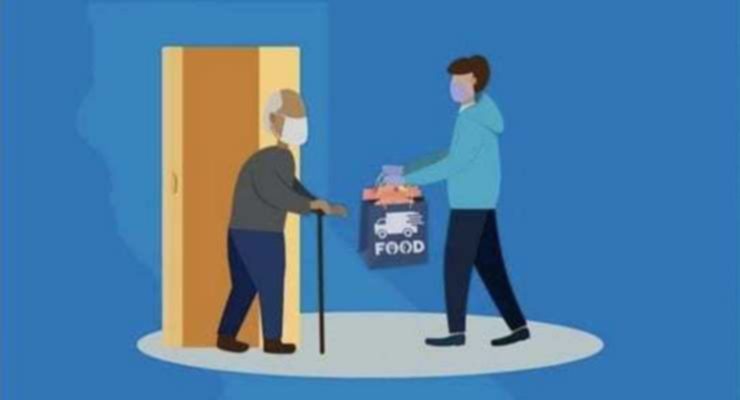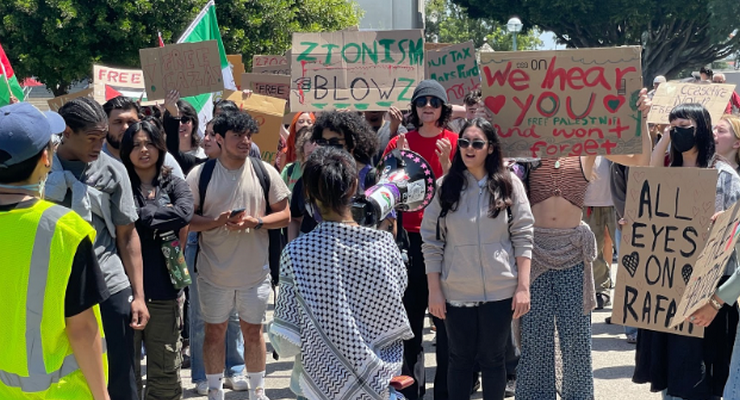
Despite concerns about high upfront costs and how long it might take the city to be reimbursed by the federal government, the Pasadena City Council on Monday extended the city’s participation in the pandemic-prompted “Great Plates Delivered” program, which buys meals from 22 local restaurants and delivers them to 235 seniors.
The statewide effort was launched by Gov. Gavin Newsom in April with the dual goal of helping vulnerable seniors during COVID-19 Safer at Home orders, as well as boosting business for local restaurants crunched economically by the pandemic.
“Restaurant businesses are under siege,’’ said Councilmember Andy Wilson, explaining his “yes” vote to extend the program.
By a 7-1 tally, the council appropriated $905,106 from the city’s diminishing Unappropriated General Fund balance to continue funding the program beyond Oct. 9, on the assumption the Federal Emergency Management Agency will continue its policy of promised reimbursements beyond that date.
FEMA has renewed the program on a month-by-month basis, typically around the ninth of the month, just as the previous renewal was expiring. Officials expect another FEMA extension by this Friday, though it’s possible that could not happen.
The program costs Pasadena $466,000 per month, according to a staff report, and the city is eligible for reimbursement of up to 93.75 percent of the costs from the FEMA and the state, combined — but that is not guaranteed.
And while reimbursement is expected, it’s also expected to take a long time to arrive.
“While (reimbursement) remains the expectation, there is no guarantee and no particular reimbursement timeline has been provided,’’ a report from Brenda E. Harvey-Williams, director of the city’s Parks, Recreation and Community Services department, says.
“Historically, reimbursements for localized disasters have sometimes taken years to receive. Given the nationwide impact of COVID-19, it is not possible to accurately determine whether the city will, in fact, receive reimbursement or estimate how long it will take.’’
What’s more, according to the report, “the city has exhausted the General Fund unassigned fund balance and is projected to draw down its 5 percent General Fund Operating Reserve from $13.8 million to $1.7 million by the end of the current fiscal year.’’
Those were concerns reiterated Monday by City Manager Steve Mermell.
“If we were assured of the reimbursement … there would be no question on staff’s mind that we’d recommend continuing to participate, because it does provide an economic benefit to our local restaurants,’’ Mermell told councilmembers.
“But there’s just a concern that we don’t know how long it will be before we can, a) apply for reimbursement, and b), when we would get that reimbursement and c), whether it will be full reimbursement.
“The general fund,” Mermell added, “is putting out quite a lot of money for a rather niche program. “Our 5 percent reserve is now down to $1.7 million, so that’s maybe a 1 percent reserve. … I’m just raising the flag, because the council has been very mindful of fiscal impacts of the pandemic on our budget.”
The council has already appropriated funds twice for the program: $600,000 in May and $361,000 in July. With Monday’s action, the city has appropriated $1,866,200 in total for the program.
Councilmembers Victor Gordo and Margaret McAustin also expressed concerns about the costs and efficiency of the program, which can max out at $66 per senior per day.
“What are the alternatives?’’ Gordo said. “We can provide a lot more people with meals for this amount of money. … How can we use these dollars … to be more efficient?’’
Gordo said he was “leaning in direction of continuing our program for another month” – and he eventually did vote in favor of the extension. But he also said the city should explore other options, such as whether Pasadena restaurants could be included in L.A. County’s version of Great Plates, should Pasadena eventually pull the plug.
For her part, McAustin – the only no vote on extending the program — said, “We can’t afford to continue this program, but we need to be able to provide an alternative to the participants. It’s incumbent on us to provide them with a list of resources. … We should make sure the participants are made (aware) of other resources in the community where they can get resources or food.’’
McAustin added: “This is a well-intended program but there are alternatives (to seniors) available that would be much more cost effective.’’
Wilson, meanwhile, urged further study of exactly how many restaurant jobs are being saved by the city’s continued investment in Great Plates. But he supported extending the city’s participation.
“We need to remember the primary intent of this program was to keep restaurants open,’’ Wilson said.
Indeed, City Clerk Mark Jomsky quoted several emails from local restaurateurs calling the program a “life saver” and “a life line.”
In the end, Councilmember Steve Madison made the motion to continue the program “coextensive with any policy directive from FEMA and from the state of California that continues the current levels of reimbursement.’’
“Restaurants are on a thread right now,” Madison said.
He indicated the program is more an economic development matter, to keep struggling restaurants afloat – and that he was confident the city would see the money reimbursed.
“I haven’t heard any material risk that we won’t receive reimbursement,’’ Madison said.
Mayor Terry Tornek, meanwhile, expressed concern about how long the city can continue to fund the program, but supported at least this extension. He also said that defunding the program abruptly would be unfair to the 235 participating seniors.
“I don’t think we can sustain this burn rate,’’ Tornek said, referring to continued dips into the city’s reserve. “(But) I don’t think we can just shut it off.’’
Seniors eligible for the program must be 65 or older, or 60-64 but at high risk as defined by the federal Centers for Disease Control. The latter category includes those who are COVID-19 positive, have been exposed to the virus or have an underlying condition.
In addition, those eligible must be living alone or with one other program-eligible adult; must not be currently receiving assistance from other state or federal nutrition assistance programs such as CalFresh or Meals on Wheels; must have a household income for one person not exceeding $74,940, or $101,460 for a household of two; and must affirm an inability to prepare or obtain meals.














 0 comments
0 comments


